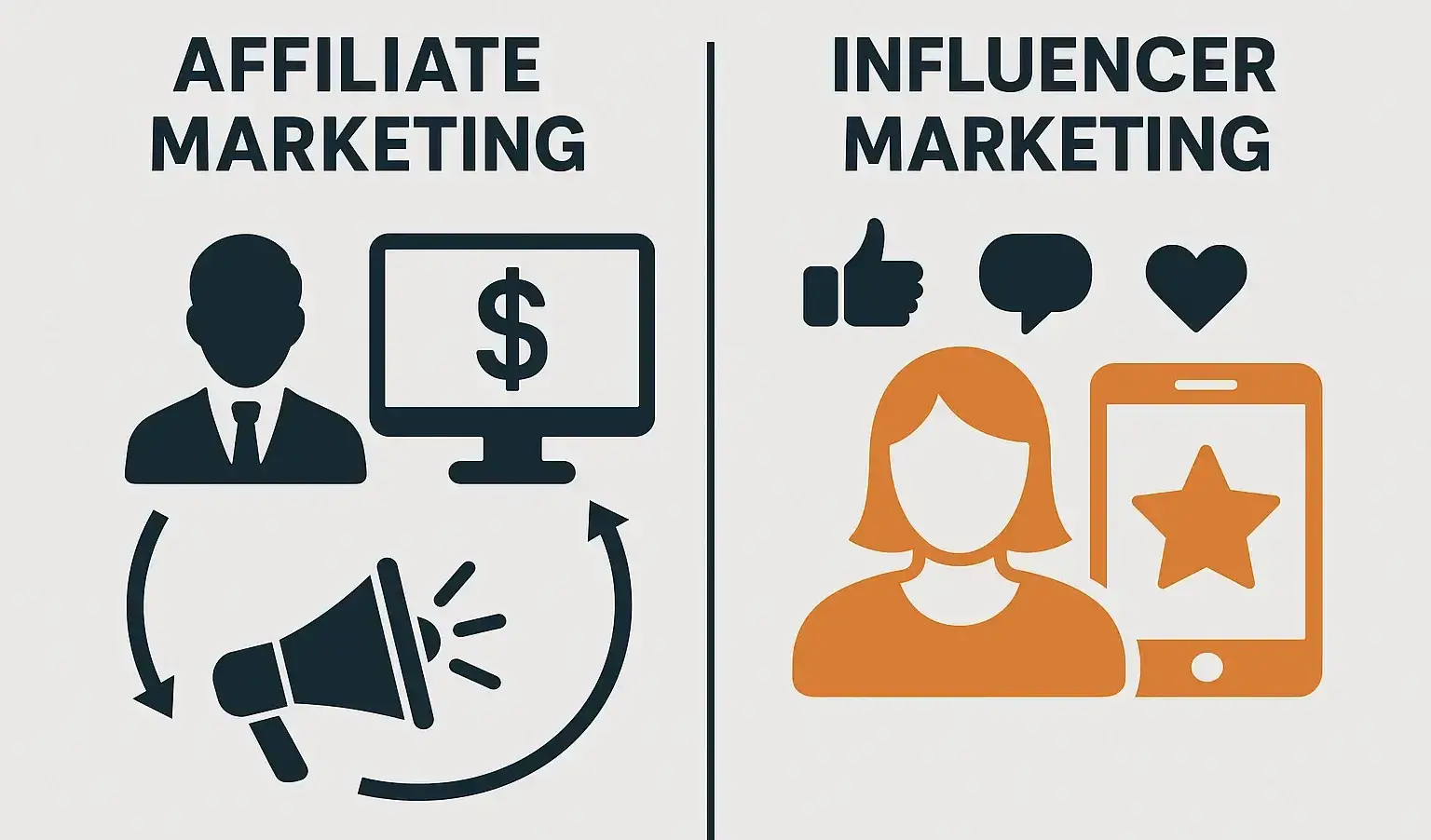As brands compete for attention online, choosing the right strategy is key to growth. Two powerful options, affiliate marketing and influencer marketing, offer distinct paths to reach and engage audiences.
Affiliate marketing rewards partners with commissions for driving sales or leads, making it a scalable, cost-effective approach for businesses focused on measurable ROI. Meanwhile, influencer marketing taps into the trust and reach of social media personalities to create sponsored content that builds awareness, engagement, and credibility.
While both rely on third-party promotion, their purposes differ. Knowing when and how to use each can help brands maximize their visibility and results.
What is Affiliate Marketing?

Affiliate marketing is a performance-based marketing model where businesses partner with individuals or companies (affiliates) who promote their products or services in exchange for a commission. This model rewards affiliates based on the results they generate, whether it is a sale, a lead, or a specific action taken by the referred customer.
How It Works
A business sets up an affiliate program and provides affiliates with unique referral links, discount codes, or banners.
Affiliates promote the business’s products through websites, blogs, email marketing, and social media.
When a customer clicks an affiliate’s link and makes a purchase or completes a required action, the affiliate earns a commission.
Commissions are tracked via cookies, UTM parameters, or affiliate tracking platforms, ensuring accurate payouts.
Common Affiliate Marketing Platforms
Several networks and platforms help businesses manage their affiliate programs efficiently, including:
1. Amazon Associates: Amazon Associates is one of the largest and most accessible affiliate programs, trusted by bloggers, YouTubers, and content creators worldwide. It offers a vast product selection and easy integration, making it ideal for beginners and experienced marketers alike.
2. ShareASale: ShareASale connects affiliates with a wide range of brands across various niches, from fashion to software. Its user-friendly interface and reliable reporting tools make it a favorite for those managing multiple campaigns.
3. CJ Affiliate (Commission Junction): CJ Affiliate is known for its partnerships with leading global brands, offering affiliates access to high-quality, trusted merchants. It also provides advanced tracking tools and detailed analytics for performance optimization.
4. Impact: Impact stands out for its robust technology stack, offering real-time reporting, dynamic payouts, and automation features. It's a go-to platform for large-scale affiliate programs and data-driven marketers.
5. Private Affiliate Programs: Private affiliate programs are run directly by brands, offering more control and exclusivity to both parties. These in-house partnerships often come with higher commissions and customized promotional resources.
Best For:
ROI-Focused Brands: Businesses looking for a cost-effective marketing strategy with a measurable return on investment (ROI) will benefit from the performance-based nature of affiliate marketing.
Scalable Online Businesses: E-commerce stores, SaaS companies, and digital product sellers can use affiliate marketing to expand their reach without the burden of upfront advertising costs.
Content-Driven Creators: Bloggers, content creators, and niche website owners can effectively monetize their audience by recommending products that align with their content and community interests.
Affiliate marketing thrives on scalability and passive income generation, making it a go-to strategy for businesses and marketers aiming for sustainable, long-term growth.
What is Influencer Marketing?

Influencer marketing is a brand collaboration strategy where businesses partner with social media influencers to promote products or services to their engaged audience. Rather than relying on traditional ads, brands leverage influencers credibility and reach to create authentic content that resonates with their followers.
How It Works
Brands identify and partner with influencers whose audience aligns with their target market.
Influencers create and share sponsored content (videos, posts, stories, or reviews) showcasing the product or service.
Compensation varies and may include monetary payments, free products, commissions, or long-term brand deals.
Performance is tracked through engagement metrics (likes, shares, comments, views) and sometimes direct sales via discount codes or affiliate links.
Common Influencer Marketing Platforms
1. Instagram: Instagram is ideal for visually engaging promotions, with influencers using posts, Stories, and Reels to showcase products in a lifestyle context. Its strong visual appeal and active user base make it a top choice for fashion, beauty, and lifestyle brands.
2. YouTube: YouTube is perfect for in-depth content like product reviews, tutorials, and unboxing videos that require more time and explanation. Influencers often build trust by sharing personal experiences and demonstrating product use over longer-form videos.
3. TikTok: TikTok thrives on short-form, creative video content that captures attention quickly and drives massive engagement. Brands often collaborate with influencers to participate in viral trends, challenges, or quick product spotlights.
4. Twitter (X): Twitter is effective for real-time engagement, brand advocacy, and tapping into trending conversations. Influencers use tweets and threads to share opinions, endorsements, or links to longer content across other platforms.
5. Blogs: Blogs offer space for long-form, SEO-friendly product reviews and evergreen content. Influencers use blog posts to provide detailed insights, comparisons, and endorsements that continue to generate traffic over time.
Best For:
Trust-Driven Campaigns: Brands looking to build credibility and awareness through relatable, authentic content will find influencer marketing especially effective.
Product Launches & Lifestyle Brands: New product launches and lifestyle-focused brands benefit from the social proof that influencers provide, making their promotions feel more natural and trustworthy.
Niche Market Reach: Companies targeting specific or niche audiences can leverage influencers with highly engaged communities to connect with the right consumers in a meaningful way.
Influencer marketing capitalizes on the power of social influence, making it an effective way to generate buzz, foster brand loyalty, and expand reach in a way that feels natural to consumers.
Comparison Between Affiliate Marketing and Influencer Marketing
| Aspect | Affiliate Marketing | Influencer Marketing |
|---|---|---|
| Payment Model | Commission-based (per sale, lead, or click) | Upfront payment, commission, or free products |
| Primary Goal | Conversions and direct sales | Brand awareness, engagement, and trust |
| Content Format | Blogs, product reviews, email marketing, banners | Social media posts, videos, stories, reels |
| Best For | E-commerce, SaaS, subscription-based businesses | Lifestyle, fashion, beauty, and consumer brands |
Pros and Cons of Each Approach

Pros and Cons of Affiliate Marketing
Pros
Cons
Affiliate Marketing Pros
Cost-effective: Affiliate marketing operates on a performance-based model, meaning brands only incur costs when a predefined action such as a sale or lead is completed. This reduces upfront spending and ensures marketing dollars are tied directly to results.
Scalable: There’s no cap on how many affiliates a brand can partner with, making it easy to expand promotional efforts across various niches and platforms. As more affiliates join, overall exposure and potential revenue grow without a proportional increase in cost.
Evergreen content: Affiliates often produce long-lasting content like blog posts, product comparisons, and tutorials that continue to attract traffic and generate conversions over time, especially when optimized for search engines.
Ideal for e-commerce and digital products: Affiliate marketing aligns well with business models that benefit from repeatable, online transactions. It’s particularly effective for e-commerce platforms, software services, and subscription-based offerings where tracking and attribution are straightforward.
Affiliate Marketing Cons
Slow to scale: Building a strong network of active, high-performing affiliates takes time. It requires recruiting, onboarding, and nurturing relationships before seeing consistent results.
Limited brand control: Since affiliates create their own promotional content, brands have less influence over messaging, tone, and how products are positioned. This can sometimes lead to misaligned branding or inconsistent quality.
High competition: Affiliates often promote multiple products, including those of competing brands. Standing out in their content or gaining priority placement can be challenging, especially in saturated markets.
Risk of low-quality traffic: Without careful monitoring, some affiliates may use questionable tactics (e.g., clickbait or misleading claims) to drive traffic, which can harm brand reputation or result in low conversion rates.
Pros and Cons of Influencer Marketing
Pros
Cons
Influencer Marketing Pros
Builds trust and credibility: Influencers have established relationships with their followers, who often view their recommendations as authentic and relatable. Partnering with the right influencer can transfer that trust directly to your brand.
Drives immediate engagement: Influencer content tends to spark quick reactions (likes, comments, shares) and saves, making it ideal for creating buzz around a product or campaign in a short amount of time.
Amplifies brand visibility: Collaborating with influencers exposes your brand to highly targeted and often hard-to-reach audiences, increasing awareness across specific niches or demographics.
Great for storytelling and lifestyle integration: Influencers excel at weaving products into their everyday lives, creating natural, story-driven content that resonates more deeply than traditional ads. This is especially effective for emotional connection and long-term brand recall.
Influencer Marketing Cons
High cost for top-tier creators: Partnering with well-known influencers can be expensive, often requiring significant upfront investment for a single post or campaign, which may not guarantee a return.
Difficult to measure ROI: While influencer campaigns can generate engagement, tracking direct conversions or long-term impact is challenging without clear attribution tools or affiliate links.
Short content lifespan: Most influencer content, especially on platforms like Instagram or TikTok, is quickly buried by newer posts. This limits its visibility and effectiveness over time unless repurposed.
Potential mismatch with brand values: If not properly vetted, an influencer’s content style, behavior, or past partnerships may conflict with a brand’s image, leading to reputational risks or audience backlash.
Which One Should You Choose?
1. Choose Affiliate Marketing for Performance-Driven Growth: If your primary goal is sales and measurable ROI, affiliate marketing is the better choice. Since you only pay for actual conversions, it is a cost-effective, long-term strategy ideal for e-commerce, SaaS, and digital product businesses.
2. Choose Influencer Marketing for Brand Awareness and Trust: If you want to build brand awareness, increase engagement, and establish credibility, influencer marketing is the way to go. It is especially effective for lifestyle, fashion, beauty, and consumer brands that rely on emotional connection and visual appeal.
3. Combine Both for Maximum Impact: Many businesses use a hybrid approach to maximize reach and conversions. For example, influencers can generate early buzz, while affiliate programs sustain momentum and drive ongoing sales through content creators and niche marketers.
Case Studies & Real-World Examples
1. Amazon Associates
One of the most well-known affiliate programs is Amazon Associates, which allows bloggers, content creators, and website owners to earn commissions by promoting Amazon products. Affiliates generate income by embedding unique Amazon links within their blogs, YouTube videos, and social media posts.
A prime example is The Wirecutter, a product review site acquired by The New York Times, which built its revenue model around Amazon’s affiliate program. By publishing in-depth product reviews and linking to Amazon, the site generates passive income while providing valuable recommendations to readers.
This approach has proven highly scalable, leveraging SEO and organic search traffic to drive continuous sales.
2. Nike & Athletes
Nike has mastered influencer marketing by partnering with top athletes and fitness influencers worldwide. One of the most notable examples is its collaboration with Cristiano Ronaldo, whose massive global following helps drive Nike’s brand engagement and sales.
Beyond celebrities, Nike also collaborates with micro-influencers and fitness coaches on Instagram and TikTok, where they showcase Nike products through workouts, styling videos, and lifestyle content. This strategy not only increases brand credibility but also taps into niche communities, creating a strong emotional connection with audiences.
Both affiliate and influencer marketing have proven successful for different brands, demonstrating the power of performance-based sales and social proof-driven engagement.
Conclusion
Both affiliate marketing and influencer marketing are powerful digital strategies, but they serve different purposes. Affiliate marketing is best for businesses focused on sales and measurable ROI, making it ideal for e-commerce, SaaS, and digital products. It is cost-effective, scalable, and long-term, but it requires time to build a strong affiliate network.
On the other hand, influencer marketing is perfect for brand awareness, engagement, and trust-building, working well for fashion, lifestyle, and consumer brands. While it provides immediate exposure, it can be expensive and harder to track in terms of direct sales.
The best approach depends on your business goals and budget. Some brands successfully combine both strategies, using influencers to generate awareness and affiliate programs to drive conversions over time.
Frequently Asked Questions
What’s the difference between affiliate marketing vs influencer marketing in terms of how brands pay and track results?
Affiliate marketing is a performance-based marketing strategy, where brands only pay affiliates when a sale, lead, or click is made through affiliate links. Tracking is precise and can be integrated with tools like Google Analytics to monitor web traffic and conversions. In contrast, influencer marketing often involves upfront payments or free products, and results are typically measured through social media engagement, reach, and content performance not just sales.
How do brands benefit from combining affiliate and influencer marketing in one campaign?
Combining affiliate and influencer marketing allows brands to harness the trust and reach of influencers while still driving performance-based outcomes through affiliate links. Influencer collaborations raise brand awareness and spark engagement, while the affiliate structure helps track key metrics like affiliate sales, average order value, and website traffic. This dual approach creates more successful campaigns that balance storytelling with measurable ROI.
Is affiliate marketing easy for beginners and what’s required to get started?
Yes, affiliate marketing is easy to start, especially for content creators and digital content creators with an existing audience. To begin, you need a website, blog, or social media account, a niche, and access to an affiliate program. Many health and fitness publishers, lifestyle bloggers, and tech reviewers use affiliate marketing strategies to promote products and earn passive income through affiliate sales.
How do influencer marketing campaigns work across different social media platforms?
An influencer marketing campaign typically starts when brands collaborate with social media influencers from nano to macro influencers to create engaging, platform-specific content. Whether it's product demos on TikTok, reviews on YouTube, or Reels on Instagram, influencers use their social media platforms to raise brand awareness, generate leads, and drive sales. These campaigns aim to connect with a target audience in a relatable and authentic way.
How do influencer and affiliate marketing compare to traditional marketing in terms of brand exposure and lead generation?
Compared to traditional marketing, both influencer and affiliate marketing are more dynamic, cost-effective, and data-driven. They provide better opportunities to boost sales, increase brand awareness, and improve lead generation by leveraging the voices of influencers typically trusted by niche communities. Additionally, these modern strategies deliver higher brand exposure through personalized, digital marketing efforts tailored to specific audience segments.

Yetunde Salami is a seasoned technical writer with expertise in the hosting industry. With 8 years of experience in the field, she has a deep understanding of complex technical concepts and the ability to communicate them clearly and concisely to a wide range of audiences. At Verpex Hosting, she is responsible for writing blog posts, knowledgebase articles, and other resources that help customers understand and use the company's products and services. When she is not writing, Yetunde is an avid reader of romance novels and enjoys fine dining.
View all posts by Yetunde Salami




















